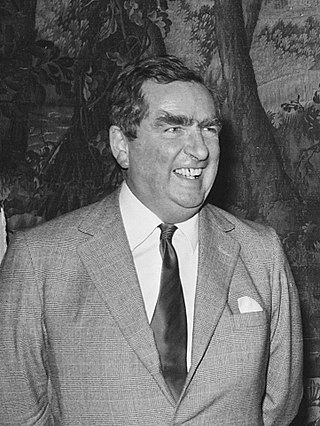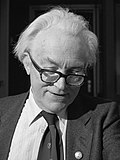
Michael Mackintosh Foot was a British politician who served as Leader of the Opposition and Leader of the Labour Party from 1980 to 1983. Foot began his career as a journalist on Tribune and the Evening Standard. He co-wrote the 1940 polemic against appeasement of Hitler, Guilty Men, under a pseudonym.

The 1983 United Kingdom general election was held on Thursday 9 June 1983. It gave the Conservative Party under the leadership of Margaret Thatcher the most decisive election victory since that of the Labour Party in 1945, with a majority of 144 seats and the first of two consecutive landslide victories.

Denis Winston Healey, Baron Healey, was a British Labour Party politician who served as Chancellor of the Exchequer from 1974 to 1979 and as Secretary of State for Defence from 1964 to 1970; he remains the longest-serving Defence Secretary to date. He was a Member of Parliament from 1952 to 1992, and was Deputy Leader of the Labour Party from 1980 to 1983. To the public at large, Healey became well known for his bushy eyebrows, his avuncular manner and his creative turns of phrase.
The Socialist Campaign Group is a grouping of left-wing Labour Members of Parliament in the House of Commons of the United Kingdom. The group also includes some MPs who formerly represented Labour in Parliament, but have had the whip withdrawn or been expelled from the party.

Isaac Foot was a British Liberal politician and solicitor.

The 1994 Labour Party leadership election was held on 21 July 1994 following the sudden death of the incumbent leader, John Smith, on 12 May. Tony Blair won the leadership and became Prime Minister after winning the 1997 general election.

Iain Cumming Gray is a Scottish politician who served as Leader of the Scottish Labour Party from 2008 to 2011. He was the Member of the Scottish Parliament (MSP) for the East Lothian constituency from 2007 to 2021, having previously represented Edinburgh Pentlands from 1999 to 2003. A former aid worker and teacher of mathematics and physics, Gray was first elected to the Scottish Parliament in 1999 as MSP for the Edinburgh Pentlands constituency, which he lost to Leader of the Scottish Conservative Party David McLetchie in 2003. Gray was returned to Holyrood in 2007 as MSP for East Lothian. Following Wendy Alexander's resignation as Leader of the Scottish Labour Party in 2008, Gray stood at the subsequent leadership election, and was elected with a 57.8% share of the vote in the second round.
The 1983 Labour Party leadership election was an election in the United Kingdom for the leadership of the Labour Party. It occurred when then leader Michael Foot resigned after winning only 209 seats at the 1983 general election, a loss of 60 seats compared to their performance at the previous election four years earlier. This was the worst showing for Labour since 1935 until 2019.
The 1935 Labour Party leadership election took place on 26 November 1935 when Herbert Morrison and Arthur Greenwood challenged Clement Attlee, the incumbent party leader of only one month and one day. Attlee, previously Deputy Leader, had been appointed as an interim leader the previous month when George Lansbury resigned and the general election was looming.
The 1980 Labour Party leadership election was held following the resignation of James Callaghan, who had been Prime Minister from 1976 to 1979 and had stayed on as leader of the Labour Party for eighteen months in order to oversee an orderly transition to his favoured successor, Denis Healey, over his own deputy Michael Foot. However, during this period the party had become bogged down in internal arguments about its procedures and future direction.
The 1988 Labour Party leadership election saw Tony Benn, identified with the left wing of the British Labour Party, challenge the incumbent leader Neil Kinnock identified with the more moderate social democratic wing.
The 1981 Labour Party deputy leadership election took place on 27 September 1981 when Tony Benn unsuccessfully challenged the incumbent deputy leader Denis Healey at the party conference. Healey had been elected unopposed as deputy leader in the previous year.

The leader of the Labour Party is the highest position within the United Kingdom's Labour Party. The current holder of the position is Keir Starmer, who was elected to the position on 4 April 2020, following his victory in the party's leadership election.
A deputy leadership election for the Labour Party in the United Kingdom took place on 2 October 1983 to replace incumbent Deputy Leader Denis Healey. Healey had served in the position since 1980, becoming deputy leader at the same time that Michael Foot became party leader. Foot and Healey had both announced their resignations after the general election on 9 June 1983, in which a disastrous performance left the Labour Party with just 209 seats in parliament.

The 1972 Labour Party deputy leadership election took place in April 1972 after Roy Jenkins resigned as deputy leader over the decision to hold a referendum on Britain's entry into the Common Market.
The 1971 Labour Party deputy leadership election took place in November 1971 after left-wingers Michael Foot and Tony Benn challenged sitting deputy leader Roy Jenkins.
The 1980 Labour Party deputy leadership election took place on 13 November 1980 when incumbent deputy leader Michael Foot was elected leader of the Labour Party, defeating Denis Healey. Healey was subsequently elected unopposed as deputy leader.
The 1970 Labour Party deputy leadership election took place on 8 July 1970, after sitting deputy leader George Brown lost his seat at the 1970 general election.
The 1923 New Zealand Labour Party leadership election was held in February 1923 to determine the future leadership of the New Zealand Labour Party. The election was won by Buller MP Harry Holland, once again retaining office.
The 2018 Green Party of England and Wales leadership election was held from June to August 2018 to select a leader of the Green Party of England and Wales. Caroline Lucas and Jonathan Bartley had been elected as co-leaders in 2016. Lucas stood down, whilst Bartley stood for re-election with a new co-leadership candidate, Siân Berry. They won re-election in the first round, and Amelia Womack won re-election as the party's deputy leader.









